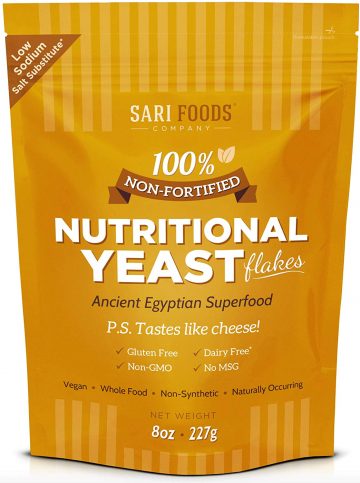When you think of yeast, you likely think of baking or bread. In baking, we use active yeast to make bread rise and get its delicious, fluffy texture. Nutritional yeast is a different type of yeast that’s eaten in its inactive form as a dietary supplement. It provides a host of health benefits for a person’s diet, which has prompted some to wonder: is nutritional yeast good for dogs? The answer to this question gets more complicated when brewers yeast enters the mix. Nutritional yeast and brewers yeast get confused easily, but are they actually the same? Here, we’ll answer these questions to discover the health value of nutritional yeast for dogs.
What’s The Difference Between Brewers and Nutritional Yeast?
A common misconception in the realms of health and veganism is that brewers yeast and nutritional yeast are the same. While these two varieties of yeast share similarities, they’re not identical. In fact, brewers yeast and nutritional yeast are two separate variations of the same yeast species.
Brewers yeast results from the process of brewing beer. It’s cultivated on hops, specifically, and causes the fermentation of beer. Brewers yeast contains several beneficial B vitamins including B1, B2, B3, B5, B6, B7, and B9. It does not, however, contain vitamin B12, which is often added to nutritional yeast.
Nutritional yeast can be grown from a range of sources such as sugar beets, whey, and molasses. Unlike most varieties of brewers yeast, nutritional yeast is typically gluten-free. It also delivers vitamins B1, B2, B3, B6, and, as aforementioned, B12. B12 is a vitamin found in animal products – the B12 in nutritional yeast makes it a popular supplement among vegans and vegetarians.
The other big difference between brewers and nutritional yeast is in flavor. Brewer’s yeast has a bitter flavor, while nutritional yeast tastes savory, with a somewhat cheesy flavor. Nutritional yeast is cultivated just as a nutritional supplement, so it’s dead early on in the development process. Brewers yeast, on the other hand, is often sold alive so that it can be used for brewing beer, after which it dies.
Can Yeast Keep Fleas Away For Dogs?
The benefits of nutritional yeast for dogs for fleas aren’t fully known due to a lack of scientific research on the topic. However, brewers yeast has been unofficially shown to repel fleas and ticks when mixed with garlic and/or oil and fed to dogs.
Not all dog breeds experience flea protection from yeast, and the evidence supporting this idea is definitely lacking. To answer the question of whether nutritional yeast keeps fleas away from your unique dog, you can try mixing a small amount of garlic with a small portion of yeast and adding it to your dog’s next meal.
What Are The Health Benefits of Yeast?
Nutritional yeast has shown to provide several health benefits for humans and dogs alike, including:
- It’s a great source of B vitamins and antioxidants.
Nutritional yeast is packed with B vitamins and antioxidants. These help support healthy eyes, skin, hair, and liver function. Plus, as a good source of vitamin B12, nutritional yeast can help raise and maintain energy levels.
- It provides trace minerals.
Nutritional yeast is a good source of trace minerals, which include selenium, manganese, zinc, and molybdenum. Including trace minerals in your diet can help your immune system, metabolism, and growth.
- It may help regulate blood sugar.
Nutritional yeast may help lower blood sugar levels and cholesterol in animals. It’s important to note that this is generally only true for chromium-enriched yeast, which is often brewer’s yeast, not nutritional yeast.
- It adds a savory flavor to regular dog food.
If your dog is a picky eater, you understand the struggle of trying to get your pet to eat enough of their food. Nutritional yeast can help with this issue because it has a savory, cheesy flavor to enhance the taste of regular kibble. By just sprinkling a small amount of nutritional yeast over your dog’s food bowl, you can encourage them to eat enough calories at every meal.
Is Nutritional Yeast Safe For Dogs?
While nutritional yeast can provide vitamins, minerals, and antioxidants to supplement your dog’s diet, there is a question of whether or not it’s safe for dogs to eat. We love our dogs, and the last thing that we would want to do is feed them a harmful ingredient.
The good news is that since nutritional yeast is inactive, it doesn’t pose a risk for intestinal problems when fed to dogs. The same can’t be said for active yeast, which can cause serious stomach upset when consumed.
That being said, nutritional yeast can cause health problems in dogs when consumed in large amounts. This leads us to the question: How much nutritional yeast for dogs is good?
The recommended amount of nutritional yeast to feed to your dog in a single meal is one teaspoon. To avoid any complications, you should never feed your dog more than one teaspoon of nutritional yeast at once, no matter the size of your dog.
You should also be wary of the possibility that your dog has a yeast allergy. For the first time you feed your dog nutritional yeast, you may want to consider starting with a portion lower than one teaspoon. If no problems arise, you can try feeding your dog one full teaspoon of nutritional yeast.
Conclusion
So, is nutritional yeast good for dogs? Simply put, yes. In small, controlled amounts, nutritional yeast can supplement your dog’s diet with vitamins, minerals, and antioxidants. Plus, dogs that are stubborn eaters may be more agreeable when savory nutritional yeast is sprinkled over their food bowl. All in all, nutritional yeast is worth a try for dog owners looking to boost the nutrition of their canine friends. Take a look at how essential oils affect your pets.






Research in beta-glucan soluble fiber in nutritional yeast, its ability to reduce cancer and growths. Just a pinch added to food is needed daily. https://nutritionfacts.org/video/benefits-of-nutritional-yeast-for-cancer/ Another source is steelcut irish oatmeal. I imagine I can’t get cancer because I eat the things that keep cancer away.